In early 2011, Cincinnati City Council signed a motion to develop a task force that would oversee the creation of new building code standards to allow for rainwater harvesting throughout the city. The work of the Rainwater Harvesting Task Force, however, may now be jeopardy due to a lack of clarity about who is responsible for maintaining such systems.
The initial goal of Cincinnati’s Rainwater Harvesting Task Force was to develop a code to allow for the reuse of rainwater for non-potable uses such as flushing toilets. One of the concerns with such a system is the potential for backflow of non-potable water into potable water sources.
To that end, one of the biggest advances over the past year was the release of a new national standard in March 2012. And according to the Task Force, it is that national standard that is being used as a template for Cincinnati.

Dater Montessori 2009 renovation achieved LEED Gold standards, and also boasts the city’s first, and only, rainwater harvesting system. Photograph by Glaserworks.
“There is no community in Ohio that has a procedure in place to allow this [rainwater harvesting] to happen,” Bob Knight, Green Partnership for Greater Cincinnati and the Rainwater Harvesting Task Force, explained to Cincinnati’s Livable Communities Committee on September 25. “Significant hurdles have been resolved in Cincinnati, and we are working on eleven additional items now.”
Some of the eleven additional items that still need to be resolved include the finalization of water quality requirements, inspection processes, certified maintenance protocols, metering, and development of tailored language from the new national code that will work for Cincinnati. Knight, however, is optimistic that the task force will meet the goals of city council and have an amended plumbing code in place by late November.
To date, the only rainwater harvesting system in place in Cincinnati was installed in 2009 at Dater Montessori School on the city’s west side. The Dater system, however, has not yet been used due to lack of agreements between various agencies and institutions. Specifically, Cincinnati Public Schools (CPS) is concerned about being responsible for maintaining the system once it is operational.
“I’m afraid the direction the Task Force is taking is not taking us in the direction we want to be,” Terry Elfers, Chief Operating Officer of CPS, exclaimed. “CPS does not want to be responsible for treating water.”
CPS is not alone in their hesitation to move forward, as Greater Cincinnati Water Works has also expressed concern about where responsibility will lie in these systems that are envisioned to help reduce water consumption while also helping Cincinnati reduce water runoff as is required by a federal consent decree.
“The heart of the problem is allowing the agencies that are responsible for this decision, to be able to point to a standard that they can defend,” Knight explained. “With this model code, the agencies can now point to it and can say that they will follow this direction.”
The Rainwater Harvesting Task Force hopes to have the language in place for Cincinnati’s plumbing code within 60 days so that they can meet their deadline. Absent that direction and approval from City Council, the activation of Dater’s rainwater harvesting system may have to continue to wait, along with other potential systems around the city.
“It would be wonderful for the City and CPS if we could resolve this so that we could support moving forward with this project,” Eflers stated as he reminded the committee that CPS has served as a leader in the community when it comes to environmental sustainability issues over the past decade.
